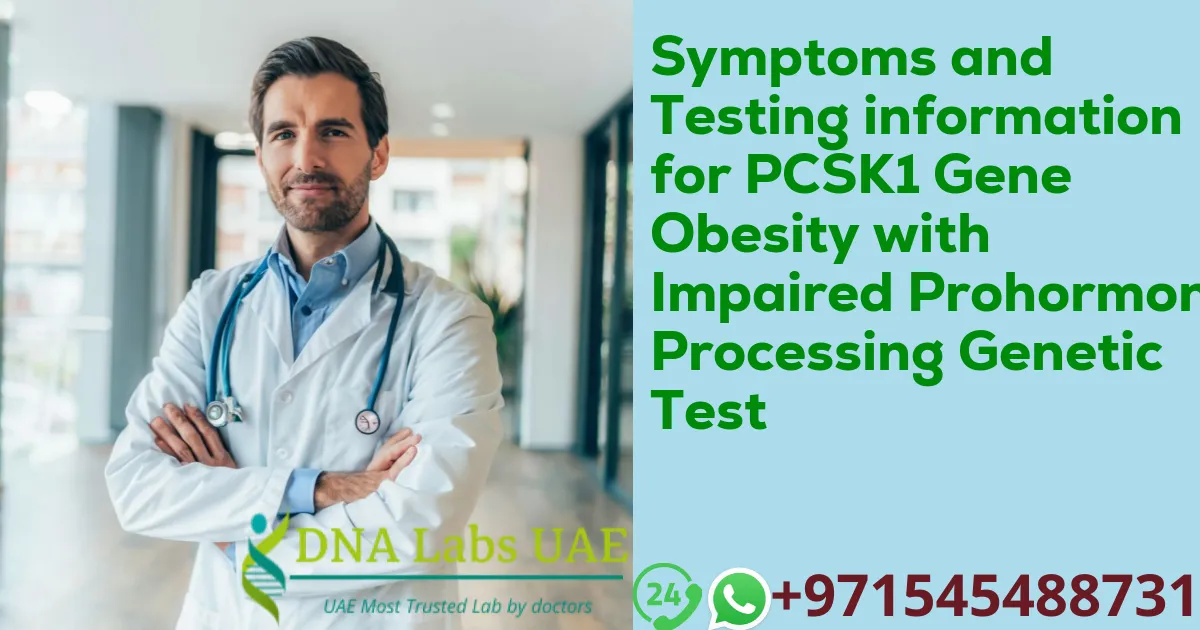Symptoms of PCSK1 Gene Obesity with Impaired Prohormone Processing Genetic Test
Obesity is a complex disorder involving an excessive amount of body fat. It’s not just a cosmetic concern; it is a medical problem that increases the risk of other diseases and health problems, such as heart disease, diabetes, high blood pressure, and certain cancers. Among the myriad of genetic factors contributing to obesity, the PCSK1 gene plays a significant role. The PCSK1 gene provides instructions for making an enzyme that is essential for the proper processing of many hormone precursors. Mutations in this gene can lead to obesity through impaired prohormone processing. Recognizing the symptoms of PCSK1 gene obesity is critical for early diagnosis and management.
Understanding PCSK1 Gene Obesity
PCSK1 gene obesity is characterized by early-onset obesity and can be accompanied by additional symptoms due to the impaired processing of prohormones. This condition is often underdiagnosed, making it essential for individuals and healthcare providers to be aware of its manifestations. The PCSK1 gene mutation affects the enzyme proprotein convertase 1/3, which is crucial for converting prohormones into active hormones. This impairment can lead to a cascade of hormonal imbalances, contributing to obesity and other metabolic syndromes.
Key Symptoms of PCSK1 Gene Obesity
- Early-onset obesity: One of the most prominent signs of PCSK1 gene obesity is the development of obesity at a very young age. This is often observed before the age of 2.
- Increased appetite: Individuals with this condition may experience hyperphagia, which is an abnormally increased appetite for food.
- Endocrine issues: Due to the impaired processing of prohormones, affected individuals may also suffer from various endocrine problems, such as hypothyroidism or adrenal insufficiency.
- Altered glucose metabolism: There may be issues with glucose metabolism, leading to an increased risk of developing type 2 diabetes.
- Gastrointestinal disorders: Problems with the gastrointestinal system, including malabsorption and constipation, can also be symptoms of PCSK1 gene obesity.
Genetic Testing for PCSK1 Gene Obesity
Genetic testing for PCSK1 gene obesity with impaired prohormone processing is a crucial step in diagnosing this condition. DNA Labs UAE offers a comprehensive genetic test that can identify mutations in the PCSK1 gene, providing valuable information for individuals and their healthcare providers. The test is designed to be thorough and accurate, employing state-of-the-art technology to analyze the genetic markers associated with PCSK1 gene obesity.
The cost of the PCSK1 gene obesity with impaired prohormone processing genetic test is 4400 AED. This investment can provide individuals with critical insights into their health, guiding potential treatment options and management strategies. For more information and to request this test, please visit DNA Labs UAE.
Conclusion
Understanding the symptoms of PCSK1 gene obesity and the availability of genetic testing can significantly impact the management and treatment of this condition. Early diagnosis through genetic testing is key to developing effective treatment plans that can address both the symptoms and the root cause of the condition. With advancements in genetic testing technologies, individuals at risk of PCSK1 gene obesity can take proactive steps towards managing their health. DNA Labs UAE is at the forefront of providing accessible and reliable genetic testing services, including the PCSK1 gene obesity with impaired prohormone processing genetic test. By recognizing the symptoms and opting for genetic testing, individuals can embark on a path towards better health and well-being.



